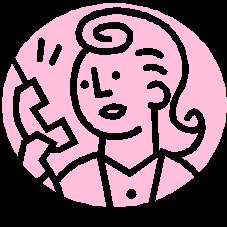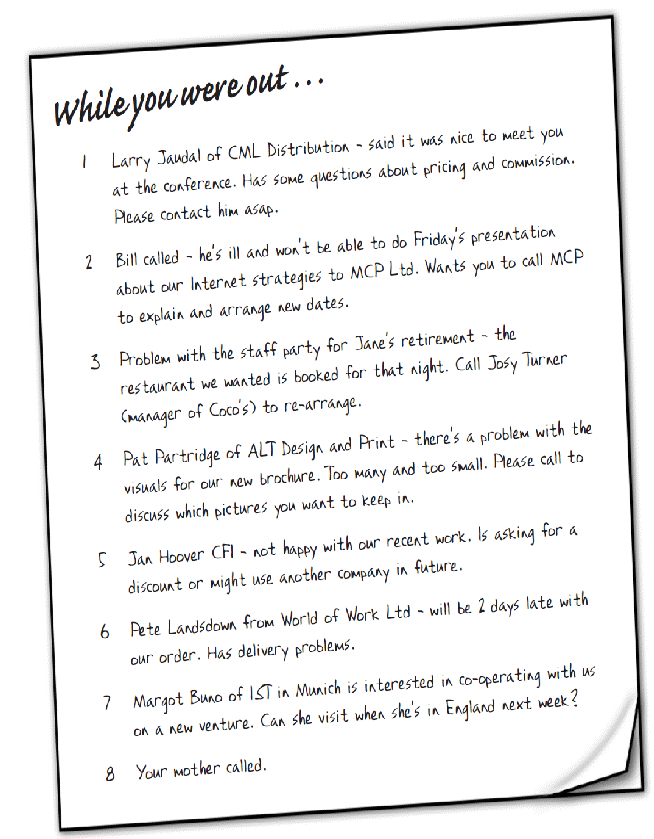Business English Шерсткова. Практикум по основам делового общения на английском языке учебное пособие
 Скачать 6.74 Mb. Скачать 6.74 Mb.
|
|
MAKING APPOINTMENTS 1. Answer the questions.
2. Study the key vocabulary for making arrangements.
3. Lisa Watson wants to make an appointment to see Martin Lennon. Complete Martin’s half of the dialogue with sentences a) to h).
Martin’s words:
4. Three people telephone the company Lawson and Fowles to change their appointments. They bring forward, postpone or cancel their appointments. Read their conversations and say who brings forward, postpones or cancels their appointments. 1. A: Lawson and Fowles. Good morning. В: Good morning. This is Andrew Sands. I’ve got an appointment with you on Thursday at half past four. A: Yes, Mr Sands. B: Well, unfortunately I've now got an important meeting in London that afternoon. Could I change my appointment to Wednesday morning? A: Well, I’m afraid the morning’s completely full up. How about Wednesday afternoon, at the same time - at four-thirty, I mean? B: Yes, that’s fine. OK, Wednesday at half past four, then. 2. A: Lawson and Fowles. Good morning. B: Good morning. This is Mr Watson of EGC. I’m afraid I have a problem with my appointment next week – I’m away all week. A: Okay. Sorry did you say Mr Watson or Mr Whiteson? B: Mr Watson. W-A-T-S-O-N. A: Fine, so you’re cancelling your appointment on Wednesday at 12 midday, then. Would you like to make another appointment now? В: No. I haven’t got my diary here. I’ll call next week. A: OK, Mr Watson. Thank you. Goodbye. 3. A: Lawson and Fowles. Good morning. B: Hello. This is Sarah Roach of Technos. I’m sorry to bother you, but it’s about my appointment - the one on Thursday. A: Yes, Mrs Roach. В: Could I postpone it until later in the day? I have to collect my car from the garage? A: We’ve got a free slot at half past four now. Is that convenient for you? B: That’s perfect. Four-thirty on Thursday. Thank you very much. Goodbye. A: Goodbye, Mrs Roach. 5. It’s time for the role-play activity. Work in pairs. Student A calls to postpone, bring forward or cancel an appointment. Student В is a secretary and answers a phone call. 6. Below is a schedule for your week in London. Before you leave for London you receive some telephone calls from people you are going to visit. They want to change their appointments. You would prefer not to meet them on the day they want, suggest a different time on the original day. Role-play the dialogue and complete your new schedule. Your partner will play the roles of all callers. Student A (you)
Student B (caller)
 7. Role-play the following telephone situations. 1. One of you is a company employee who has arranged to meet a colleague (your partner) from one of your subsidiaries. Explain that you cannot keep the appointment, and give a reason. Suggest an alternative time. 2. Student A: You want to speak to Ms Braun about your account with her company, W&W. If Ms Braun isn’t in the office, leave the following information:
Student B: You are a receptionist at W&W. Student A would like to speak to Ms Braun, but she is out of the office. Take a message and make sure you get the following information:
3. Write travel details (name, company name, date of arrival) of any three representatives who are arriving at your company. Student A: your boss has given you the list of key participants for your company’s annual international sales conference and has asked you to check if they are coming. Ring the company and:
Student B: you work in the Scottish office of АВТ. In this activity you will need to play two roles: the switchboard of ABT and the PA/Secretary. In the activity you need to carry out the following steps:
4. Student A: you are phoning Bank Direct about a money transfer you’re expecting from the USA. You want to speak to Sharon Elliot, your personal banker, to find out what is happening. Student B starts the conversation. Student B: you are the telephonist at Bank Direct. Sharon Elliot is on the other line at the moment. You start the conversation.
  8. You are the manager of a rapidly growing company. When you returned to the office after a recent conference, eight messages had been left for you. Which should you return first? Put the calls in order of importance.  Role-play your three most important phone calls from ex. 8 with your partner. LEAVING VOICEMAIL MESSAGES Sometimes, there may not be anyone to answer the telephone and you will need to leave a message. Follow this outline to make sure that the person who should receive your message has all the information he/she needs.
Here are examples of voicemail messages 1. Telephone: (Ring... Ring... Ring...) Hello, this is Tom. I’m afraid I’m not in at the moment. Please leave a message after the beep..... (beep) Ken: Hello Tom, this is Ken. It’s about noon and I’m calling to see if you would like to go to the Mets game on Friday. Could you call me back? You can reach me at 367-8925 until five this afternoon. I’ll talk to you later, bye. |

 tudent B
tudent B
 sk to speak to Sharon Elliot
sk to speak to Sharon Elliot
 sk if she can call back
sk if she can call back
 ive your number and say
ive your number and say 